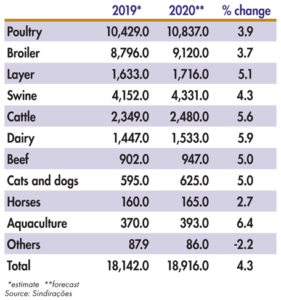Brazilian demand for poultry feed continues to rise
|
Sales to the end of 2020 are forecast to remain strong, outstripping 2019’s increase. Sales of poultry feed in Brazil are expected to continue growing this year as demand for the country’s poultry and other animal proteins continues to rise at home and in export markets. The positive performance recorded last year continued into the first quarter of this year and will remain strong to year-end, forecasts Brazil’s animal feed producers’ association Sindirações. While sales for both broiler and layer feeds ended 2019 positively, their performance during the first quarter was healthier still. Over the first three months of 2020, broiler feed sales reached 9.1 million metric tons (mt), an increase of almost 4% in comparison with the same period last year. Demand is forecast to remain steady as the year progresses meaning that 2020 as a whole should see broiler feed demand rise by 4%. Sales of layer feed grew by a more impressive 5% over the first quarter, reaching 1.7 million mt. Across all species, demand over the first quarter rose by 4.3% to reach 18.9 million mt. This figure, however, is expected to soften slightly as the year progresses, meaning that, by year-end, total animal feed sales will record a still healthy growth rate of 4%. According to Sindirações Chief Executive Officer Ariovaldi Zani, the animal feed industry decisively held its own during the first quarter. Driven by demand from the livestock sector, the industry recorded a significant increase. The contagious optimism of December last year justified predictions of another happy new year. Positives at home and away In its home market, like in much of the rest of the world, a deep recession has already started. Brazil, like most other countries, has experienced closed foodservice outlets, disruptions in meat processing plants and a reduction in consumers’ disposable income due to COVID-19. However, various government pension and tax reforms started last year, along with new measures to help the economy during the pandemic, are expected to continue to prop up consumer demand this year, and this will particularly help food purchases. Additionally, as in previous downturns, consumers are again looking to buy cheaper animal proteins. Data published in June reveals that they are turning to chicken meat. Abroad, China has become by far the biggest market for Brazilian chicken exports now accounting for over 50% of products sold overseas, up from 28% in 2018. Demand, however, is also rising from the rest of the world. By volume, Brazilian poultry meat exports between January and June were 1.7% higher than over the same period last year. Favorable markets for chicken at home and overseas should help to ensure that poultry feed demand continues to grow. Any difficulties at home, it is hoped, will be offset by strong overseas purchases. Where layer feed is concerned, demand is being driven by the increased placing of layers, although excess egg production should be avoided as older birds are removed during the colder months. Q1 2020 Brazilian feed production, 000 mt
2020’s positive outlook builds on a successful 2019. Figures released in December last year show that over the nine months to the end of September, the feed sector’s total sales rose by 3%, higher than originally predicted, while for 2019 as a whole demand is thought to have grown by 3.5%. The swine, beef and poultry sectors were the main drivers last year, with the Brazilian Association of Animal Protein, describing the year as “extraordinary.” Over the first three quarters, demand for broiler feed in Brazil stood at 24.6 million mt, an increase of 2.9% compared to the year before, while that of layer feed rose to 4.8 million mt, up by 1.4%.
Source: www.WATTAgNet.com/articles/39481 |























































































